from May. 22, 1865
Letter from Pablo Herrera
-
Full Title
Letter from Pablo Herrera to Mr. Hassaurek
-
Description
Pablo Herrera, foreign minister of Ecuador, expressed his nation’s condolences to the United States on May 22, 1865.
-
Transcription
Transcription is available through the Department of State Office of the Historian
-
Source
-
Rights
This item is in the public domain and may be reproduced and used for any purpose, including research, teaching, private study, publication, broadcast or commercial use, with proper citation and attribution.
-
Tags
-
Cite this Item
Pablo Herrera. "Letter from Pablo Herrera to Mr. Hassaurek". Remembering Lincoln. Web. Accessed December 15, 2025. https://rememberinglincoln.fords.org/node/1208
-
Creator
Pablo Herrera
-
Date
May 22, 1865
from May. 22, 1865
Letter from Pablo Herrera to Mr. Hassaurek
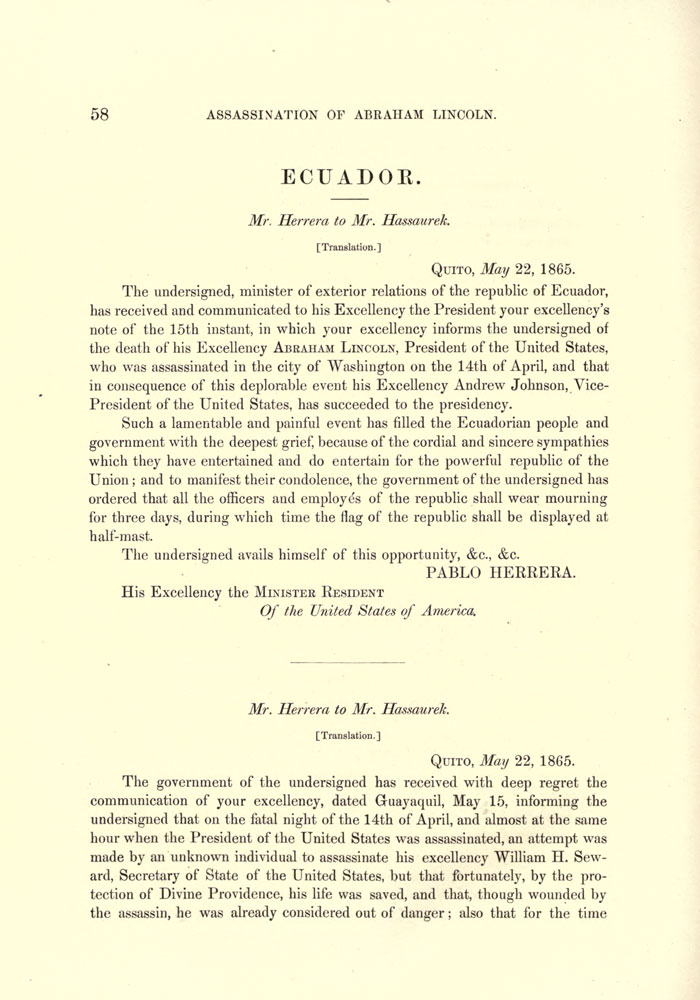
-
Description
Pablo Herrera, foreign minister of Ecuador, expressed his nation’s condolences to the United States on May 22, 1865.
-
Source
-
Rights
This item is in the public domain and may be reproduced and used for any purpose, including research, teaching, private study, publication, broadcast or commercial use, with proper citation and attribution.
-
Creator
Pablo Herrera
-
Date
May 22, 1865
from May. 9, 1865
From the Legation of His Imperial Majesty the Shah of Persia
-
Full Title
From the Legation of His Imperial Majesty the Shah of Persia
-
Description
A message from the legation of the Shah of Persia offering condolences on behalf of the leader and the people of Persia. The Shah transmitted this message via telegram to his emissary Suleiman Khan in Paris, who passed it along to the new President as a gesture of goodwill. Such a message demonstrates just how widely felt the impacts of Lincoln's death were.
-
Transcription
Transcription available through the Department of State Office of the Historian
-
Source
-
Rights
This item is in the public domain and may be reproduced and used for any purpose, including research, teaching, private study, publication, broadcast or commercial use, with proper citation and attribution.
-
Tags
-
Cite this Item
Suleiman Khan. "From the Legation of His Imperial Majesty the Shah of Persia". Remembering Lincoln. Web. Accessed December 15, 2025. https://rememberinglincoln.fords.org/node/1206
-
Creator
Suleiman Khan
-
Date
May 09, 1865
from May. 9, 1865
From the Legation of His Imperial Majesty the Shah of Persia
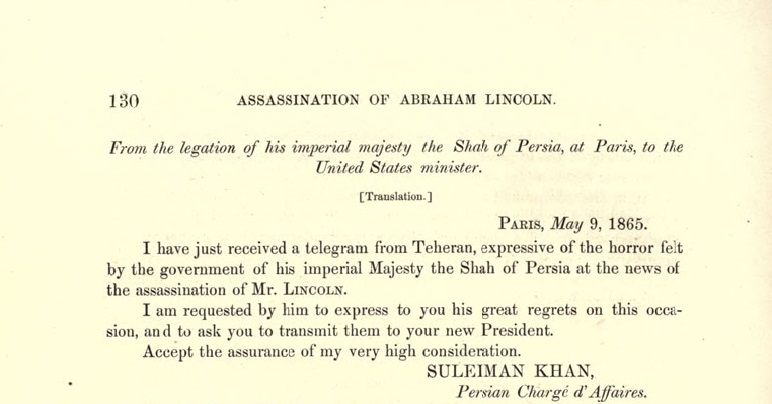
-
Description
A message from the legation of the Shah of Persia offering condolences on behalf of the leader and the people of Persia. The Shah transmitted this message via telegram to his emissary Suleiman Khan in Paris, who passed it along to the new President as a gesture of goodwill. Such a message demonstrates just how widely felt the impacts of Lincoln's death were.
-
Source
-
Rights
This item is in the public domain and may be reproduced and used for any purpose, including research, teaching, private study, publication, broadcast or commercial use, with proper citation and attribution.
-
Creator
Suleiman Khan
-
Date
May 9, 1865
from May. 2, 1865
Inhabitants of Zurich
-
Full Title
Inhabitants of Zurich
-
Description
A letter of condolences written to the US Government by a committee of residents from the Swiss city of Zurich. The committee praises the Union victory over the Confederacy, noting its impacts on not only the United States but also "all mankind". While mourning Lincoln, the document makes comparisons between Lincoln's impact and the previous global political impact of the Revolutionary War and George Washington. This letter provides a window into global reactions to the end of the war, as well as international opinions on what the role of a post-war United States would look like.
-
Transcription
Transcription is available via the Department of State Office of the Historian.
-
Source
-
Rights
This item is in the public domain and may be reproduced and used for any purpose, including research, teaching, private study, publication, broadcast or commercial use, with proper citation and attribution.
-
Tags
-
Cite this Item
O. Bulle. "Inhabitants of Zurich". Remembering Lincoln. Web. Accessed December 15, 2025. https://rememberinglincoln.fords.org/node/1205
-
Creator
O. Bulle
-
Date
May 2, 1865
from May. 2, 1865
Inhabitants of Zurich
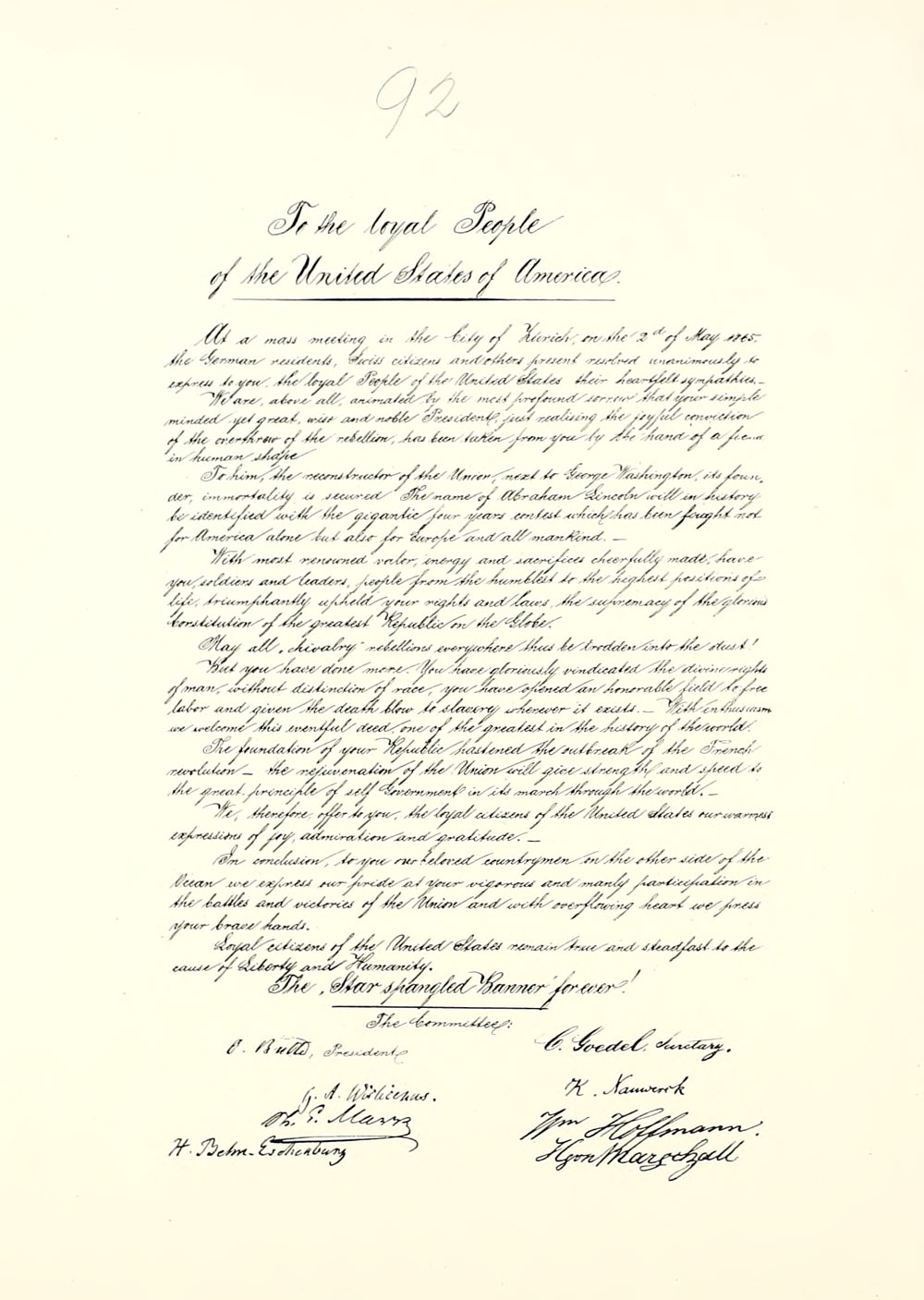
-
Description
A letter of condolences written to the US Government by a committee of residents from the Swiss city of Zurich. The committee praises the Union victory over the Confederacy, noting its impacts on not only the United States but also "all mankind". While mourning Lincoln, the document makes comparisons between Lincoln's impact and the previous global political impact of the Revolutionary War and George Washington. This letter provides a window into global reactions to the end of the war, as well as international opinions on what the role of a post-war United States would look like.
-
Source
-
Rights
This item is in the public domain and may be reproduced and used for any purpose, including research, teaching, private study, publication, broadcast or commercial use, with proper citation and attribution.
-
Creator
O. Bulle
-
Date
May 2, 1865
from Apr. 15, 1865
General Schultz to Colonel Wagnerd
-
Full Title
General Schultz to Colonel Wagnerd
-
Description
In light of the assassination of Abraham Lincoln, General S. Schultz informs Colonel Louis Wagnerd that a celebratory parade for the end of the war in Pennsylvania would not go on as planned.
-
Transcription
Head Quarters.
Department of Pennsylvania,
Philadelphia, Pa. April 15th 1865.
Lt: Col: Louis Wagnerd
Comidg Camp "William Penn"
Chelten HIlls, Penna
Colonel
I am directed by the Commanding General to inform you the proposed parade of of he U.S. Troops in this city will not take place on monday next 17" isnt. on account of the sad news received this morning. You will therefore not be required to furnish the men from your command, for that purpose as requested, by the letter dated from these Head Quarters April 14" 1965.
I am Colonel,
Very Respectfully
Your Ob'd't Servant
Gnl. S. Schultz
Ap't Adj't General -
Source
U.S. National Archives, Records of the Provost Marshal General's Bureau
-
Rights
This item is in the public domain and may be reproduced and used for any purpose, including research, teaching, private study, publication, broadcast or commercial use, with proper citation and attribution.
-
Tags
-
Cite this Item
National Archives. "General Schultz to Colonel Wagnerd". Records of the Provost Marshal General's Bureau. Remembering Lincoln. Web. Accessed December 15, 2025. https://rememberinglincoln.fords.org/node/1199
-
Creator
National Archives
-
Publisher
Records of the Provost Marshal General's Bureau
-
Date
1865-04-15
from Apr. 15, 1865
General Schultz to Colonel Wagnerd
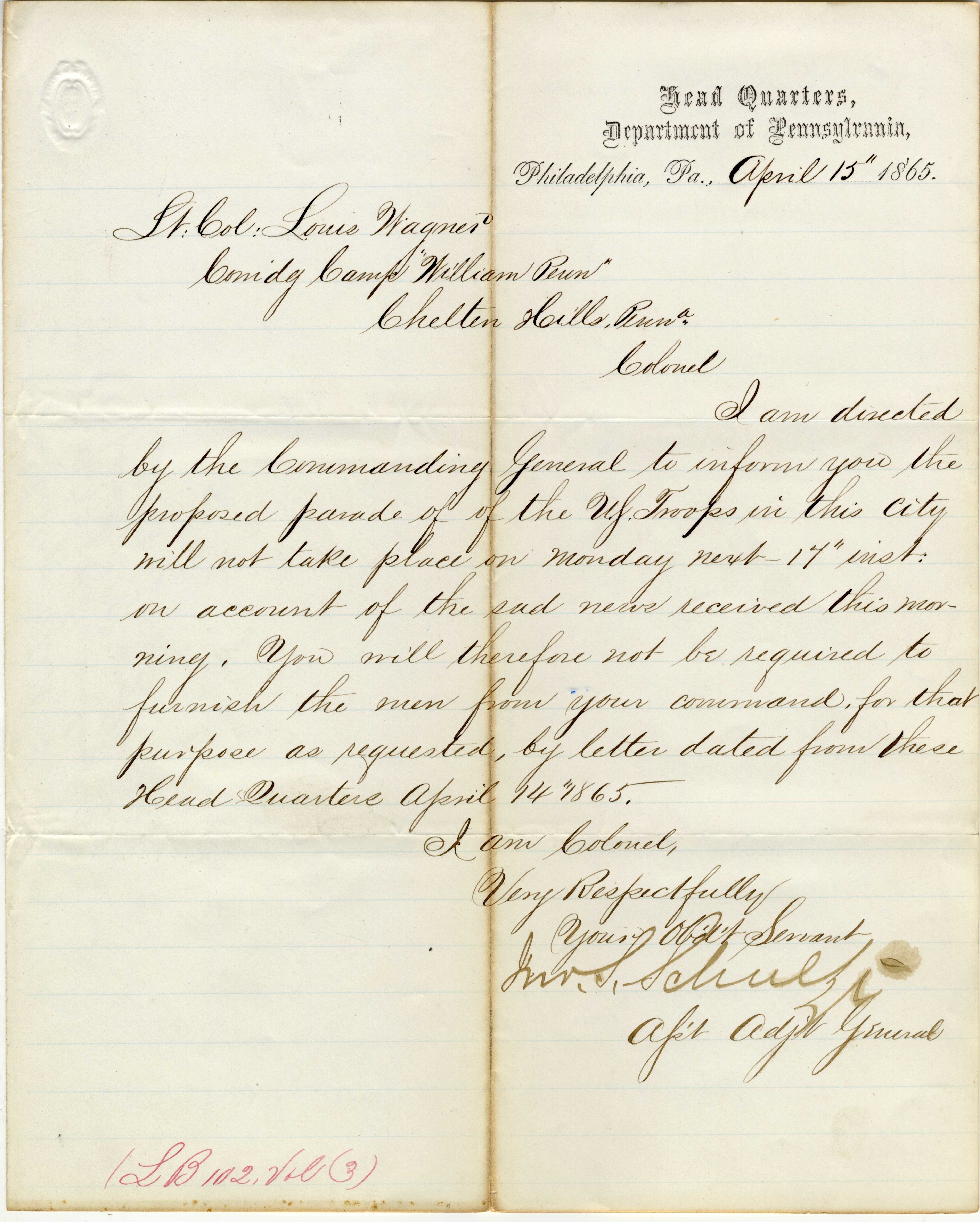
-
Description
In light of the assassination of Abraham Lincoln, General S. Schultz informs Colonel Louis Wagnerd that a celebratory parade for the end of the war in Pennsylvania would not go on as planned.
-
Source
U.S. National Archives, Records of the Provost Marshal General's Bureau
-
Rights
This item is in the public domain and may be reproduced and used for any purpose, including research, teaching, private study, publication, broadcast or commercial use, with proper citation and attribution.
-
Creator
National Archives
-
Publisher
Records of the Provost Marshal General's Bureau
-
Date
April 15, 1865
from Apr. 15, 1865
Letter from Lincoln's Cabinet to Andrew Johnson
-
Full Title
Letter from Lincoln's Cabinet to Andrew Johnson
-
Description
Lincoln's Cabinet wrote to Andrew Johnson the day of his assassination to inform him of the events and to inform him of the next move for the U.S. government.
-
Transcription
Washington City DC
April 15, 1865, -
Sir:
Abraham Lincoln, President of the United States, was shot by an assassin last evening, at Ford's Theater in this city and died at the hour of 22 minutes of seven o'clock.
About the same time at which the President was shot, an assassin entered the back chamber of the house of Wm H. Seward, Secretary of State, and stabbed him in several places,
in the throat, neck, and face, severely if not mortally wounding him. Other members of the Secretary's family were dangerously wounded by the assassin while making his escape.
By the death of President Lincoln, the office of President has devolved under the Constitution upon you. The emergency of the government demands that you should immediately qualify, according to the requirements of the Constitution and enter upon the duties of President of the United States. If you will please make known your pleasure, such arrangements as you deem proper will be made.
Your Obedient Servants,
Hugh McCulloch Secretary of the Treasury
Edwin M Stanten Secretary of War
Gideon Welles Secretary of Navy
W. Dennison Postmaster General
J.P. Usher Secretary of the Interior
James Speed Attorney General -
Source
U.S. National Archives, General Records of the Department of State
-
Rights
This item is in the public domain and may be reproduced and used for any purpose, including research, teaching, private study, publication, broadcast or commercial use, with proper citation and attribution.
-
Tags
-
Cite this Item
National Archives. "Letter from Lincoln's Cabinet to Andrew Johnson". General Records of the Department of State. Remembering Lincoln. Web. Accessed December 15, 2025. https://rememberinglincoln.fords.org/node/1198
-
Creator
National Archives
-
Publisher
General Records of the Department of State
-
Date
1865-04-15
from Apr. 15, 1865
Letter from Lincoln's Cabinet to Andrew Johnson
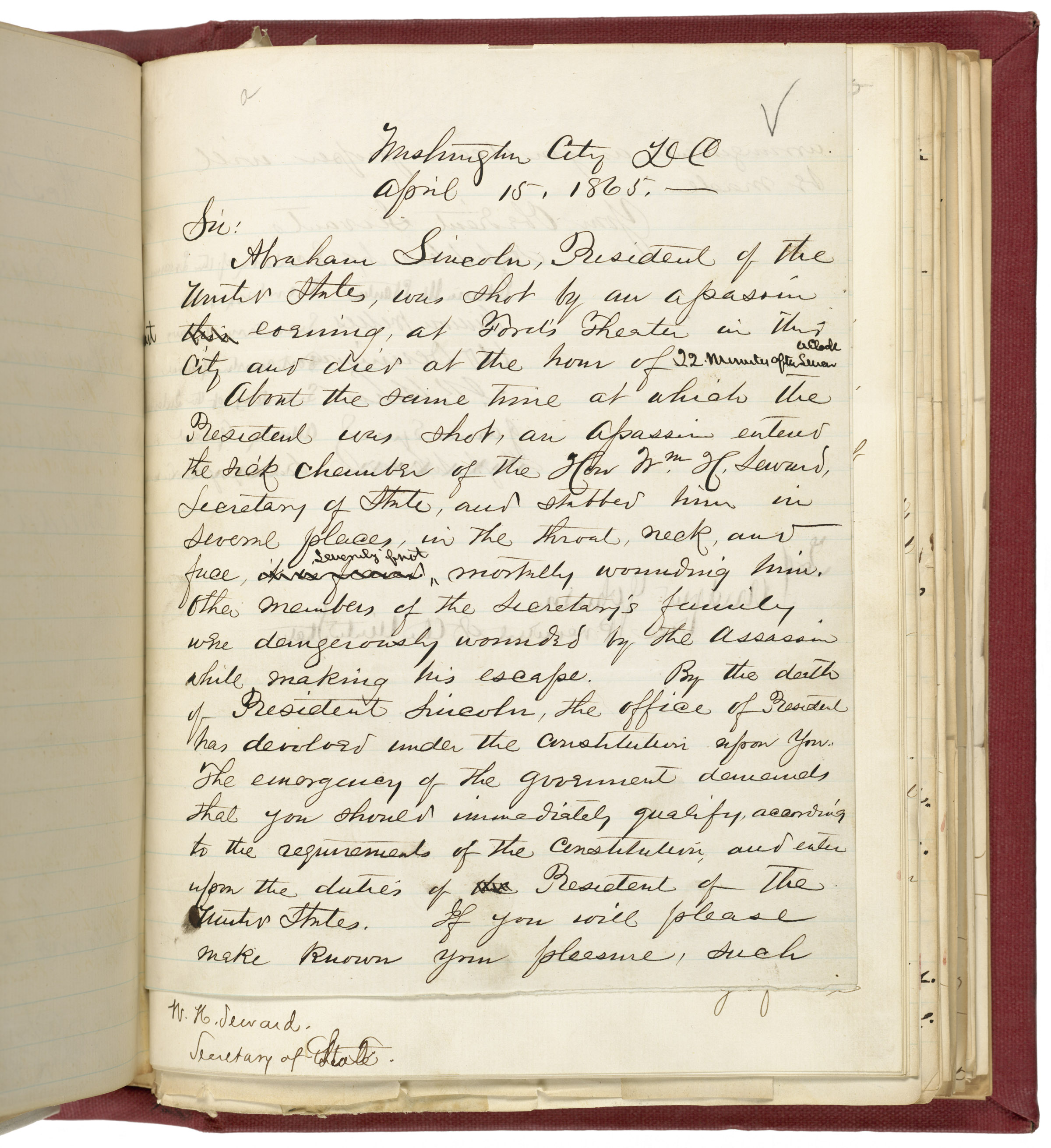
-
Description
Lincoln's Cabinet wrote to Andrew Johnson the day of his assassination to inform him of the events and to inform him of the next move for the U.S. government.
-
Source
U.S. National Archives, General Records of the Department of State
-
Rights
This item is in the public domain and may be reproduced and used for any purpose, including research, teaching, private study, publication, broadcast or commercial use, with proper citation and attribution.
-
Creator
National Archives
-
Publisher
General Records of the Department of State
-
Date
April 15, 1865
from Jul. 30, 1865
A. Van Rensellaer to Walt Whitman
-
Full Title
A. Van Rensellaer to Walt Whitman
-
Description
A letter to Walt Whitman from a friend describing an interaction with Lincoln
-
Source
Special Collections Research Center, University of Chicago Library
-
Rights
This item is in the public domain and may be reproduced and used for any purpose, including research, teaching, private study, publication, broadcast or commercial use, with proper citation and attribution.
-
Tags
-
Cite this Item
A. Van Rensellaer. "A. Van Rensellaer to Walt Whitman". Remembering Lincoln. Web. Accessed December 15, 2025. https://rememberinglincoln.fords.org/node/1183
-
Creator
A. Van Rensellaer
-
Date
July 30, 1865
from Jul. 30, 1865
A. Van Rensellaer to Walt Whitman
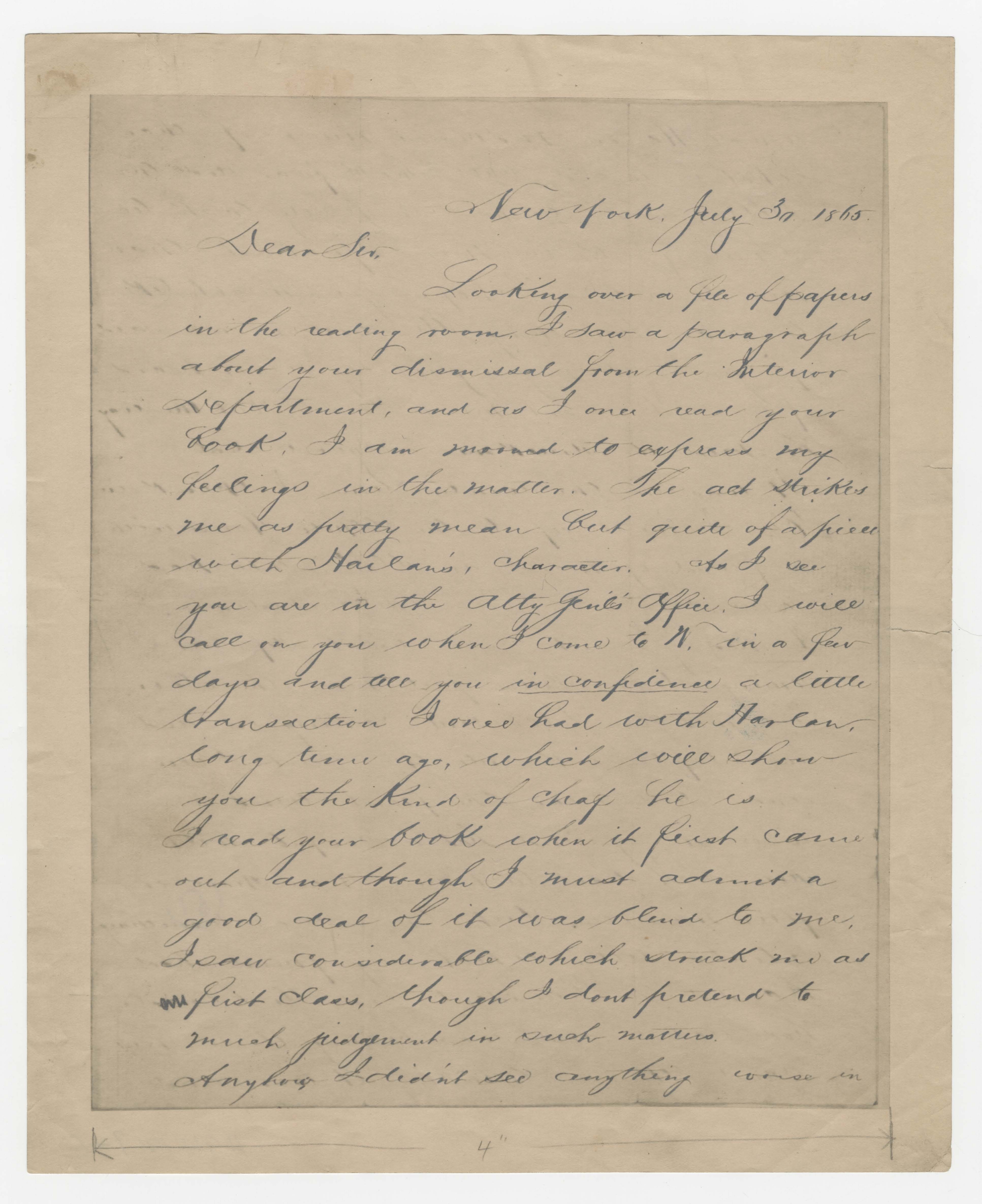
-
Description
A letter to Walt Whitman from a friend describing an interaction with Lincoln
-
Source
Special Collections Research Center, University of Chicago Library
-
Rights
This item is in the public domain and may be reproduced and used for any purpose, including research, teaching, private study, publication, broadcast or commercial use, with proper citation and attribution.
-
Creator
A. Van Rensellaer
-
Date
July 30, 1865
from Apr. 17, 1865
Edwin Stanton to William Tecumseh Sherman
-
Full Title
Edwin Stanton to William Tecumseh Sherman
-
Description
A letter from Secretary of War, Edwin Stanton, to General William Tecumseh Sherman detailing the assassination of Lincoln and the attack on Seward.
-
Transcription
^[[$100]]
The following dispatch was received by Gen’l Sherman from Sec’y Sherman. [[?]] is furnished for the information of Brig’d Gen’l E.W. Rice.
“President Lincoln was murdered at 10-o’clock last night in the private box at Ford’s Theatre in this city by an assassin who shot him through the head with a pistol ball. About the same time the Seward’s house was entered by another assassin, who stabbed the secretary ^[[in]] several places, but it is thought he may possibly recover; but his son Fred will probably die of wounds received from the assassin. The assassin of the President, leapt from the box, brandishing a dagger, exclaiming “Sic semper tyrannis” and that “Virginia was revenged”. Mr. Lincoln fell senseless from his seat and continued in that state until 22 after 1’ o clock, at which time he breathed his last. Gen’l Grant was published to be at the theatre, but he did not go. Vice President Johnson now becomes President and will take the oath of office and assume the duties today. I have no time to add more except to say that I find evidence that an assassin is also on your track and I beseech you to be more heedful than Mr. Lincoln was of such knowledge.
(over)
(Sgd.) Edwin Stanton
Sec'y of War
Washington April 17 - 17 D.C.
By order of Brevet Major General Jas. M. Corse
L.H. Everts
Asst. Adjt. Genl.
[transcription by Alli Hartley-Kong] -
Source
Special Collections Research Center, University of Chicago Library
-
Rights
This item is in the public domain and may be reproduced and used for any purpose, including research, teaching, private study, publication, broadcast or commercial use, with proper citation and attribution.
-
Tags
-
Cite this Item
Edwin Stanton. "Edwin Stanton to William Tecumseh Sherman". Remembering Lincoln. Web. Accessed December 15, 2025. https://rememberinglincoln.fords.org/node/1182
-
Creator
Edwin Stanton
-
Date
April 17, 1865
from Apr. 17, 1865
Edwin Stanton to William Tecumseh Sherman
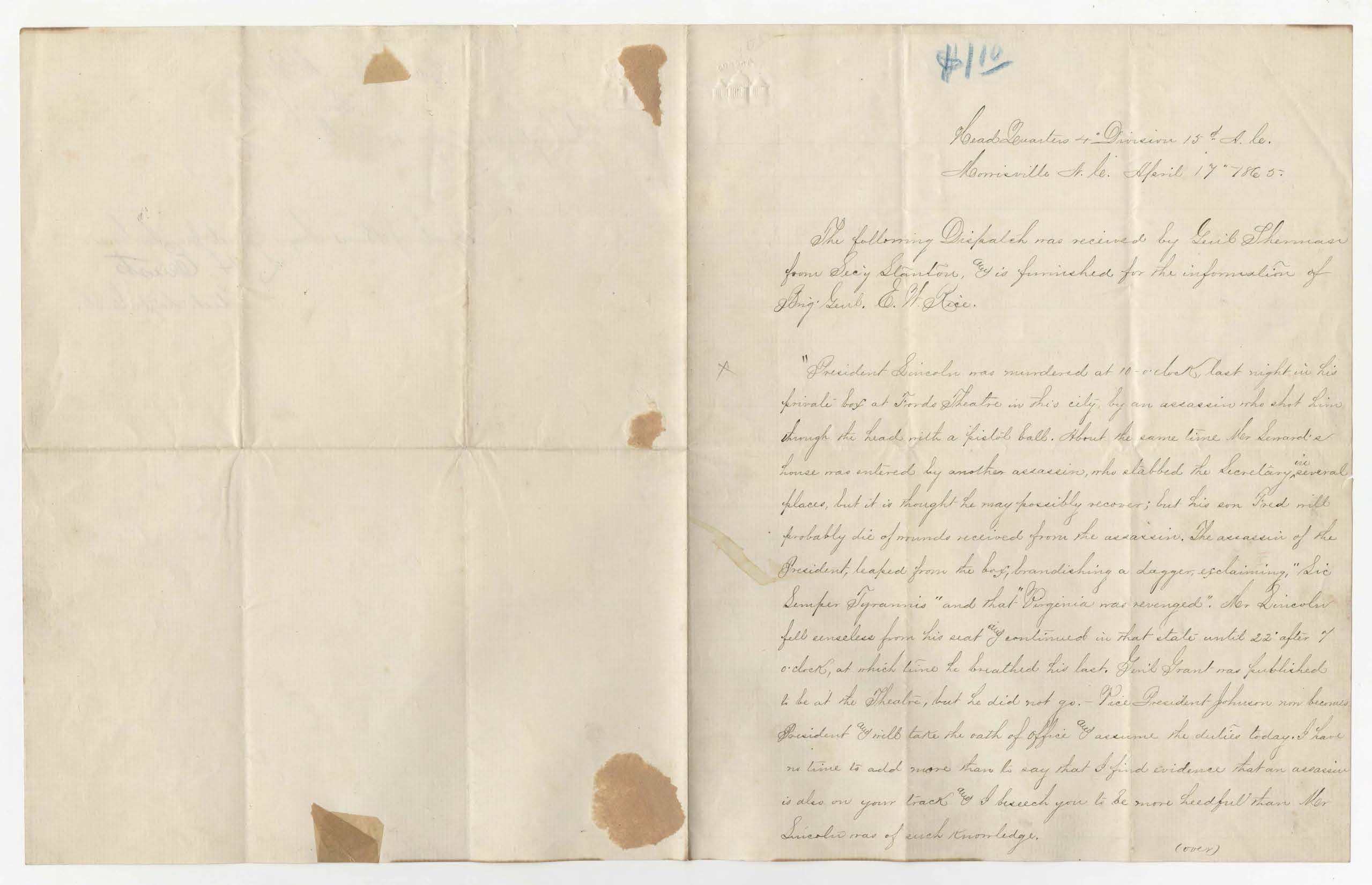
-
Description
A letter from Secretary of War, Edwin Stanton, to General William Tecumseh Sherman detailing the assassination of Lincoln and the attack on Seward.
-
Source
Special Collections Research Center, University of Chicago Library
-
Rights
This item is in the public domain and may be reproduced and used for any purpose, including research, teaching, private study, publication, broadcast or commercial use, with proper citation and attribution.
-
Creator
Edwin Stanton
-
Date
April 17, 1865
from Jun. 6, 1865
A letter from Robert Todd Lincoln to Dr. Josiah G. Holland
-
Full Title
A letter from Robert Todd Lincoln to Dr. Josiah G. Holland
-
Description
A letter from Robert Todd Lincoln to Dr. Josiah G. Holland, a writer who later wrote a biography of Abraham Lincoln called the Life of Abraham Lincoln in 1866.
-
Transcription
Chicago June 6th/65
My dear Sir
Your letter received
some days ago & I have unfortunately
mislaid it, so that I have to answer
it from memory.
As I understand your purpose
it is to write a biography which is
to be rather personal than political.
With regard to sources of information
I may be able to guide you a little
One of my father’s old time friends
is Dr. A. G. Henry of Washington
City, D.C. & who may be addressed in
care of Senator Williams at Washington, D.C. He was
very intimate with him after some time
in 1830-35 & will be please to help you
all he can. Another of his friends of
among those to whom you might
apply. I understand that Mr. H
is intending to write a biography
himself & you will judge for yourself
as to whether to write to him.
I have explained at some length
the reasons of the messiness of my
knowledge & I try you will attribute
the little value of this letter to that cause.
With great respect I am
Very sincerely yours
Robert T. Lincoln
Dr. J.E. Holland
&c &c
[*Robert T. Lincoln*]
[Transcription by Henry R.] -
Source
Special Collections Research Center, University of Chicago Library
-
Rights
This item is in the public domain and may be reproduced and used for any purpose, including research, teaching, private study, publication, broadcast or commercial use, with proper citation and attribution.
-
Tags
-
Cite this Item
Robert Todd Lincoln . "A letter from Robert Todd Lincoln to Dr. Josiah G. Holland". Remembering Lincoln. Web. Accessed December 15, 2025. https://rememberinglincoln.fords.org/node/1180
-
Creator
Robert Todd Lincoln
-
Date
June 6, 1865
from Jun. 6, 1865
A letter from Robert Todd Lincoln to Dr. Josiah G. Holland
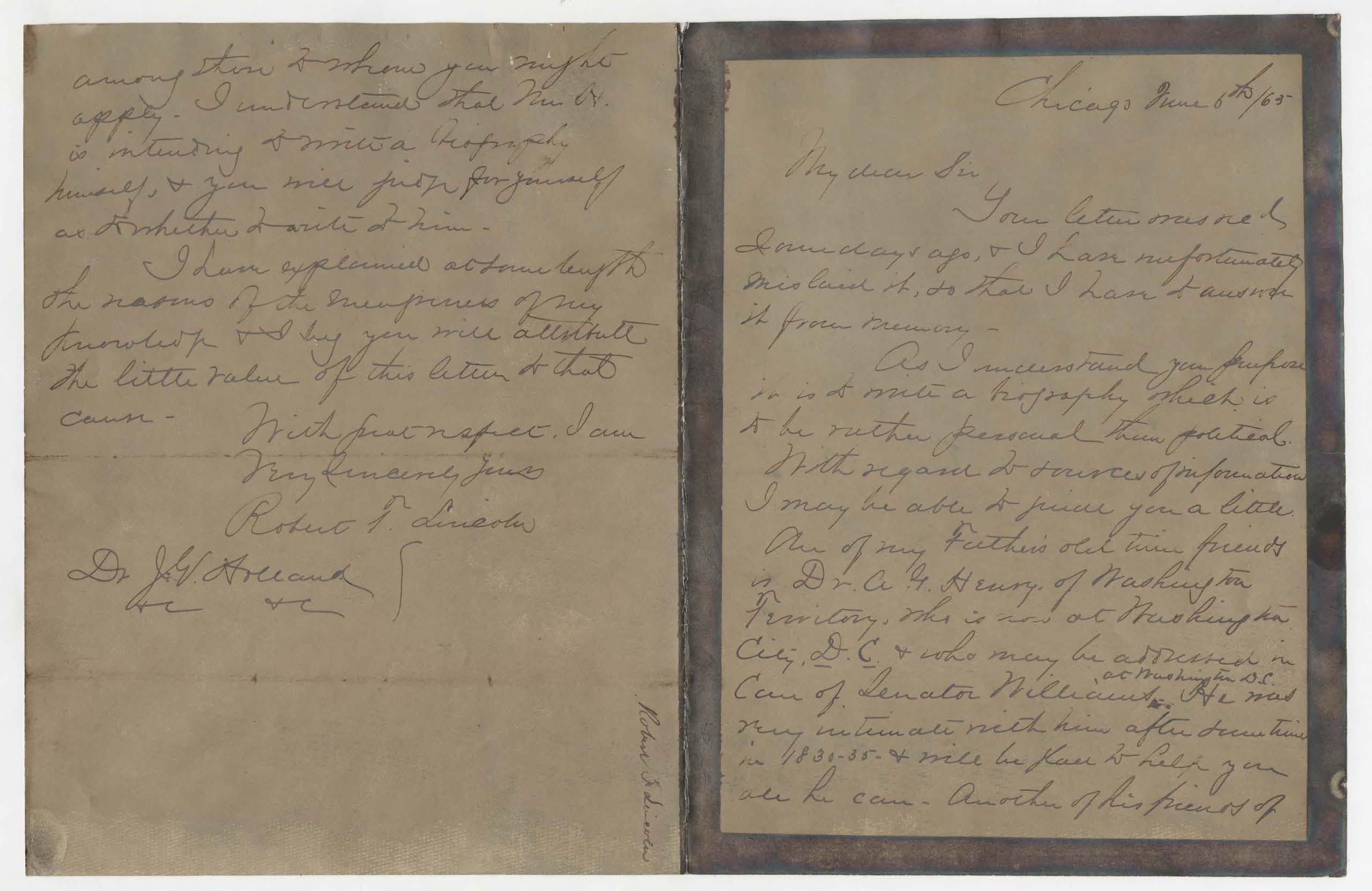
-
Description
A letter from Robert Todd Lincoln to Dr. Josiah G. Holland, a writer who later wrote a biography of Abraham Lincoln called the Life of Abraham Lincoln in 1866.
-
Source
Special Collections Research Center, University of Chicago Library
-
Rights
This item is in the public domain and may be reproduced and used for any purpose, including research, teaching, private study, publication, broadcast or commercial use, with proper citation and attribution.
-
Creator
Robert Todd Lincoln
-
Date
June 6, 1865
from Dec. 4, 1865
Mary Todd Lincoln to Dr. Josiah G. Holland
-
Full Title
Mary Todd Lincoln to Dr. Josiah G. Holland
-
Description
A letter from Mary Todd Lincoln to Dr. Josiah G. Holland after receiving a copy of Holland's biography of her husband, the Life of Abraham Lincoln.
-
Transcription
Chicago Dec 4th 1865
Private –
Dr. J. G. Holland
My dear Sir:
The Biography of my deeply lamented husband, which you have so kindly sent me, has been received and read, with very great interest. After a careful perusal of the work, I find the statements, in most instances, so very correct, that I feel quite surprised, as to the extent of your minute information. From the description of my husband, early struggles, which he has, so frequently described to me, to the foolish and uncalled for rencontre, with Gen Shields, all are truthfully portrayed.
It is exceedingly painful to me, now suffering under such an overwhelming bereavement, to recall that happy time my beloved husband had so entirely devoted himself to one, for two years before my marriage, that I doubted trespassed, many times & oft, upon his great tenderness & amiability of character. There never existed a more loving & devoted husband & such a Father, has seldom been bestowed on children. Crushed and bowed to the earth, with our great great sorrow, for the sake of my poor afflicted boys, I have to strive to live on, and comfort them, as well as I can. You are aware that with all the President’s deep feeling, he was not a demonstrative man, when he felt most deeply, he expressed the least. There are some very good persons who are inclined to magnify conversations & incidents, connected with their slight acquaintance with this great & good man. For instance, the purported conversations This last event, occurred about six months before our marriage, when, Mr. Lincoln thought he had some right to assume to be my champion, even on frivolous occasions. The poor Gent, in our little gay circle, was oftentimes, the subject of mirth & even song. And we were then surrounded by several of those, who have since been appreciated by the world. The Gent was very impulsive & on the occasion referred to, had placed himself before us, in so ridiculous a light, that the love of the ludicrous had been excited within me & I pressure, I gave vent to it, in some very silly levies. After the reconciliation between the contending parties Mr L & myself mutually agreed never to refer to it & except in an occasional light manner, between us, it was never mentioned. I am surprised at so distant a day, you should have ever heard of the circumstance.
Between the President & the Hospital nurse, it was not his nature to commit his griefs and religious feelings so fully to words & that with an entire stranger. Even between ourselves, when our deep & touching sorrows were one & the same, his expressions were few – Also the lengthy account of the lady who very wisely persisted in claiming a hospital for her State, my husband never had the time to discuss these matters, so lengthily to any person or persons-- too many of them came daily in review before him – And again, I cannot understand how strangely his temper could be at so complete a variance from what it always was, in the home circle. There he was always so gentle & kind. Before closing this long letter which I fear will weary you, ___ you get through it – allow me again to assure you of the great satisfaction the perusal of your Memoirs have given me.
I remain very truly and gratefully,
Mary Lincoln
[Transcription by Susan Brady Carr] -
Source
Special Collections Research Center, University of Chicago Library
-
Rights
This item is in the public domain and may be reproduced and used for any purpose, including research, teaching, private study, publication, broadcast or commercial use, with proper citation and attribution.
-
Tags
-
Cite this Item
Mary Todd Lincoln. "Mary Todd Lincoln to Dr. Josiah G. Holland". Remembering Lincoln. Web. Accessed December 15, 2025. https://rememberinglincoln.fords.org/node/1179
-
Creator
Mary Todd Lincoln
-
Date
December 4, 1865
from Dec. 4, 1865
Mary Todd Lincoln to Dr. Josiah G. Holland
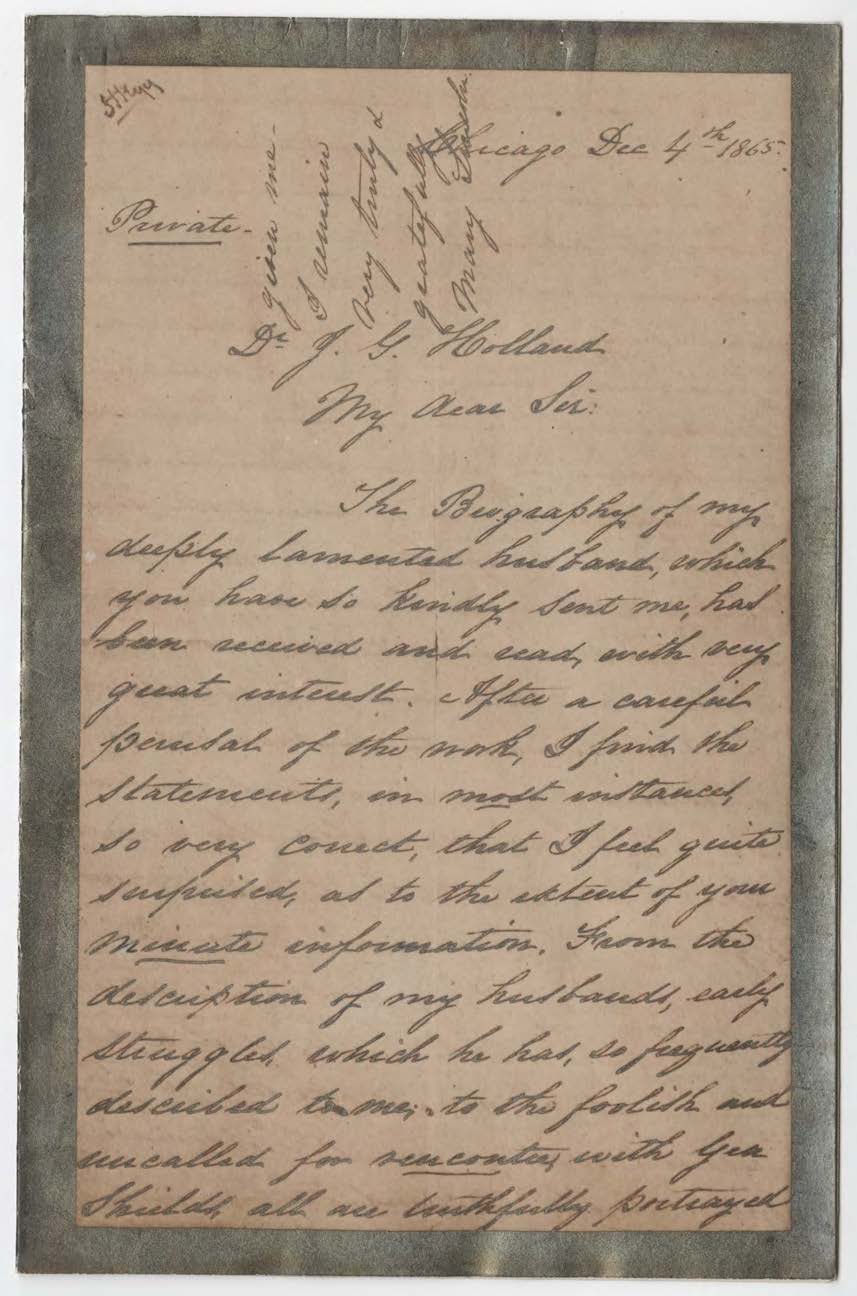
-
Description
A letter from Mary Todd Lincoln to Dr. Josiah G. Holland after receiving a copy of Holland's biography of her husband, the Life of Abraham Lincoln.
-
Source
Special Collections Research Center, University of Chicago Library
-
Rights
This item is in the public domain and may be reproduced and used for any purpose, including research, teaching, private study, publication, broadcast or commercial use, with proper citation and attribution.
-
Creator
Mary Todd Lincoln
-
Date
December 4, 1865
from Aug. 31, 1865
A Letter from Mary Todd Lincoln to Mrs. Anson G. Henry
-
Full Title
A Letter from Mary Todd Lincoln to Mrs. Anson G. Henry
-
Description
A Letter from Mary Todd Lincoln to Mrs. Anson G. Henry. Mrs. Henry's husband was a friend of Abraham Lincoln and the Surveyor General of Washington Territory at the time of Lincoln's death. Dr. Henry died on July 30, 1865. Mary Lincoln's letter expresses her sympathy for Mrs. Henry and her own grief for the death Dr. Henry and her husband.
-
Transcription
Chicago, Aug 31st 1865.
My very dear Mrs. Henry,
Bowed down and broken hearted, and feeling so deeply for you, in your agonizing bereavement, I feel justified in approaching you at this time when we all feel I’ll alike crushed.
We’ve have both been called upon to resign, to our Heavenly Father, two of the best men & the most devoted husbands that too unhappy women ever possessed.
The terrible news that our beloved friend who so sympathized with us in our irreparable loss, is gone, has been received by us, only a day or two since. My sons and myself have been overcome, by the startling and heart rendering intelligence. We consider that we have lost our best & dearest friend. It has been my most ardent wish that Dr. Henry should have received an appointment in Washington, it would have been a great comfort to us, in our own overwhelming sorrow to have had you both near us. In this great trial, it is difficult, to be taught resignation, the only comfort, that remains to us is the blessed consolation, that our beloved ones, are rejoicing in their Heavenly Home, free from all earthly trials & in the holy presence of God & his angels, are singing the praises of the Redeemer. I long, to lay my own weary head, down to rest, by the side of my darling husband. I pray God, to grant me sufficient grace, to await his time, for I long, to be at rest. Without my idolized husband, I do not wish to remain on earth.
Mr. Wm. T. Henry, called a day or two since. I was confined to my bed & did not see him. Robert saw him & he left, your telegram. Robert, immediately, wrote on to Washington, urging & pleading, for the appointment, of your son in law. We pray & trust the appeal, will be granted. You have no one, my dear friend, who could possibly feel for you, as I do, your grief is mine, in it, I am living over my own disconsolate state & the gratitude we feel for the dear Doctor’s recent sympathy, for us, in all things together with the great love, we all bore him, makes your troubles my own. How much, I wish, you lived nearer to us. We could then, weep, together over our dreary lot. The world, without my beloved husband & our best friend, is a sad and lonely place enough.
Our poor little family, would be a gloomy picture, for any one to see, who has a heart to feel. It was a great trial, to me, when Dr. Henry left here in June, that I was unable to have access to some boxes, stored in the warehouse, where was deposited a cane of my husband’s, a large family Bible & some other things design for presentation, to the Dr. So soon as I can get to them, I shall avail myself, of the first opportunity, of sending them to you. I can offer you in conclusion, of this very sad letter, my dear Mrs. Henry, very little consolation, for I am so weary & heavy laden myself, over everything, concerning us both. I trust you will write me to me, for you are very dear to me, now & ever.
With regards to your family, I remain always
Your attached friend,
Mary Lincoln.
[Transcription by Alicia B., Ford's Theatre Society, and Janet Scanlon.] -
Source
Special Collections Research Center, University of Chicago Library
-
Rights
This item is in the public domain and may be reproduced and used for any purpose, including research, teaching, private study, publication, broadcast or commercial use, with proper citation and attribution.
-
Tags
-
Cite this Item
Mary Todd Lincoln. "A Letter from Mary Todd Lincoln to Mrs. Anson G. Henry". Remembering Lincoln. Web. Accessed December 15, 2025. https://rememberinglincoln.fords.org/node/1178
-
Creator
Mary Todd Lincoln
-
Date
August 31, 1865
from Aug. 31, 1865
A Letter from Mary Todd Lincoln to Mrs. Anson G. Henry
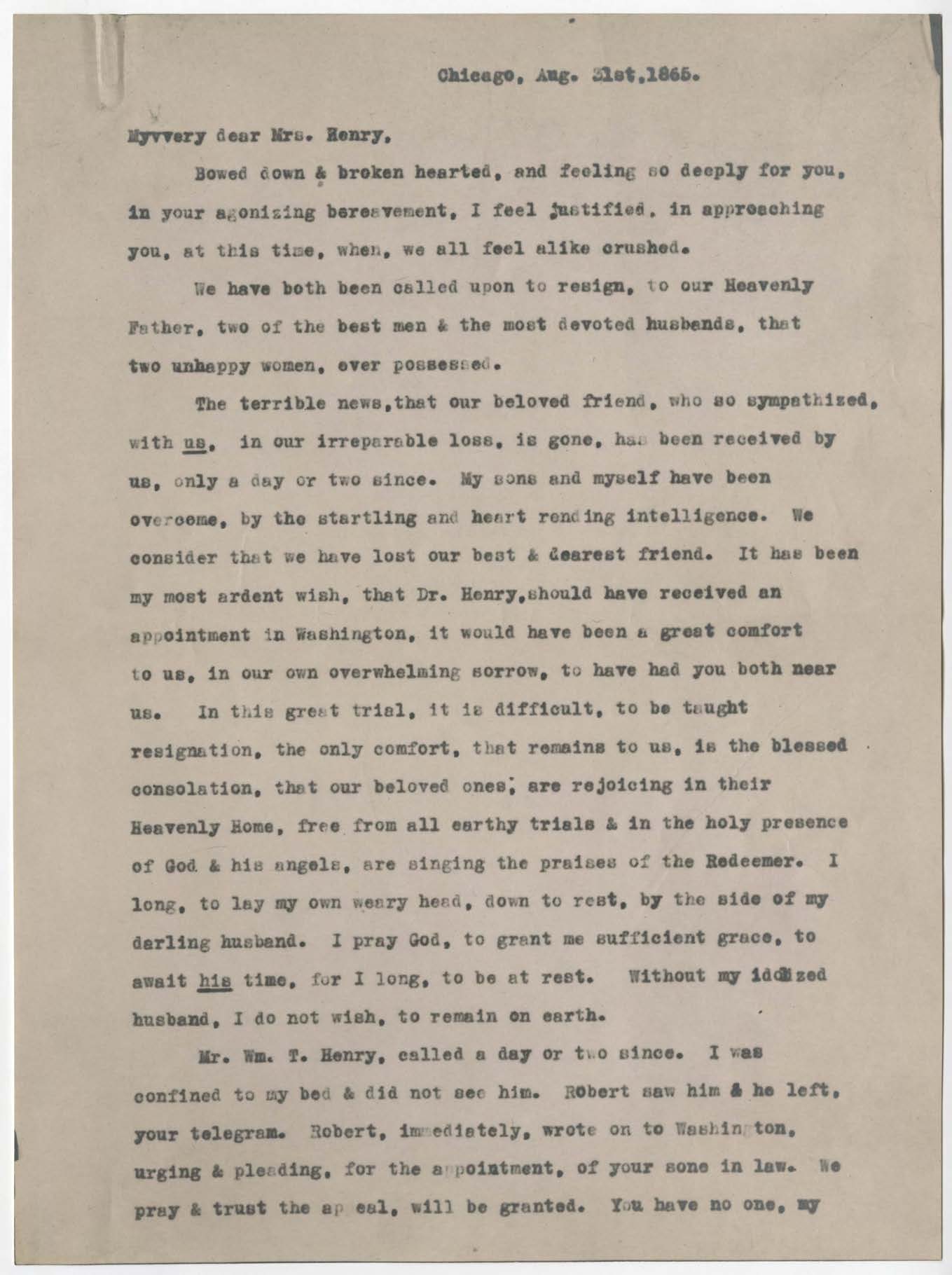
-
Description
A Letter from Mary Todd Lincoln to Mrs. Anson G. Henry. Mrs. Henry's husband was a friend of Abraham Lincoln and the Surveyor General of Washington Territory at the time of Lincoln's death. Dr. Henry died on July 30, 1865. Mary Lincoln's letter expresses her sympathy for Mrs. Henry and her own grief for the death Dr. Henry and her husband.
-
Source
Special Collections Research Center, University of Chicago Library
-
Rights
This item is in the public domain and may be reproduced and used for any purpose, including research, teaching, private study, publication, broadcast or commercial use, with proper citation and attribution.
-
Creator
Mary Todd Lincoln
-
Date
August 31, 1865